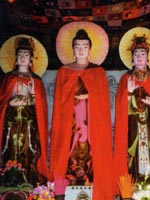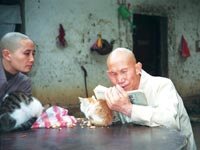 |
 |
|
|
Where the World Falls Away
By Katie Benner (that's Beijing)
Updated: 2004-02-13 10:59
|

Instant Karma's gonna get you
|
According to scholar Bill Porter, there have been about one million religious hermits in China since the time of the Yellow Emperor, many of them living in the area around the Zhongnan Mountain range. So it follows that if two documentary filmmakers and a curiosity seeker like me wanted to find them, we'd head for Zhongnan. We were fortunate enough to speak with several hermits who have gone, as Porter writes, "where the world does not follow." And thus a relaxing hike in a lovely mountain range became a fascinating encounter with a little known but long respected world of Chinese tradition.
The trip began in Xi'an, Shaanxi province, a city with no shortage of tourist allure, and proceeded southward to the Zhongnan Mountains. There, far from the crowds at the Terracotta Warriors, we stretched our legs on mildly challenging terrain reminiscent of New Hampshire's White Mountains. Our physical efforts were rewarded with small waterfalls, gurgling streams and beautiful views of the rolling landscape dotted with small villages and temples.
Local authorities are starting to recognise the potential of religious architecture and ritual, and this has encouraged a trickle of explorers to visit the area's temples and monasteries. But the hermits live far beyond the temple gates and it is unlikely we would have found them on our own. Besides the difficulty of locating recluses, I cannot in good conscience recommend that lay travellers seek them out. My companions Ted and Linlin are practising Buddhists given permission by monks in monasteries to film their lives (see Cinefile, Nov 2003). It was these monks who led us to homes hidden in the mountains. As Ted put it, "If too many people bother these hermits, it means they have to retreat further, making their hike to town for supplies an additional day's journey."
|

A master instructs a nun and a cat on the ways of benevolence and compassion
|
We hiked for several days following trails marked by flags of colourful trash. At the secluded Ci'en monastery atop Taixing Mountain were four young monks in saffron robes led by a small master or shifu whose white beard and long hair made him nearly a caricature of an ancient wise one. With their close-cropped hair, grace and delicate ears, his disciples exuded sensuality as much as piety while they prayed. Their senses were sharp and alert, even though they are taught to let go of the distractions that enter through the ears, nose, eyes, mouth and skin. The ceremony before me was a ritual I had seen co-opted enough - along with Buddhism itself - in films and books to feel initially cynical about the chanting and bell-ringing. But these monks were unselfconscious in their devotion, luring me to believe that this was a life well led. That said, it was a difficult vocation, explained one disciple, who admitted that after three years in the hills he was afraid of his own dreams.
Some of the Buddhists we encountered lived as true hermits in abandoned farms or caves, and some lived with roommates or in small monasteries. What unified them was a desire to practise away from the world. Bill Porter writes, "No explanation has ever been offered or demanded for the admiration the Chinese have had for hermits. Hermits were simply there: beyond city walls, in the mountains, lone columns of smoke after a snowfall." And some felt no need to explain their choices. "I don't like to talk about the past. We live in the mountains as a way to get rid of the past," said one hermit. Asked if he thought about the city, if he wanted to engage with laymen, or felt that he was hiding from the world's problems, he replied as if speaking to an obstinate child: "These questions are irrelevant, useless." He was here to be alone and attain enlightenment. Meditating and reading sutras in seclusion let him be closer to the heart, to let go of the distractions people create to avoid facing their fears and desires. He said this seated in front of his house, so far from the town that the valley looked empty. There was no elaborate garden, only a small outdoor altar. It seemed that the world had indeed fallen away from him.
The ancient poet and scholar Han Shan, whose life is revered as the romantic hermit ideal, wrote about isolation as well as about joy and enlightenment. Sadness was a prominent element of his work, it seemed important to understand. Buddhism is so romanticised in the West that even Richard Gere and Steven Segal crow about the benefits of enlightenment. It's easy to forget that beyond Hollywood stars and wealthy, meditating suburban housewives, Buddhism can be a religious life that requires extreme mental and emotional hardship. In his book Road to Heaven, Porter quotes a Taoist monk as saying, "To find people who truly believe is the biggest problem we have. People willing to reduce their desires or cultivate tranquillity in this modern age are very few. This is the age of desire."
The charming hermitages, the gorgeous mountains and the philosophical discussions about the real began to fray my nerves. I am an admirer, a cynic and a voyeur, but I wanted to escape these mountains, leave this tranquil room far from dirty streets, and roll in the illusion and mess of people and desires.
|
|
|
|
